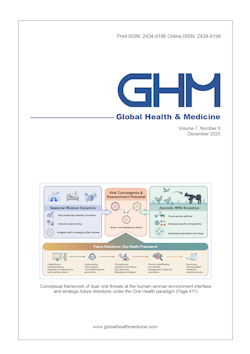Global Health & Medicine 2025;7(3):266-274.
Factors related to feelings toward nursing practices for foreign pregnant and postpartum residents among midwives and nurses at perinatal medical centers in Osaka, Japan: A questionnaire survey
Koh C, Maeda T, Miyashita R
The number of foreign residents in Japan continues to increase, and many are of reproductive age. Foreign residents report many difficulties when receiving nursing care. Midwives and nurses also experience negative feelings about nursing care for foreigners. This study clarified the factors related to feelings toward nursing practices for foreign pregnant and postpartum residents among midwives and nurses at perinatal medical centers in Osaka, Japan. A web-based survey was conducted from 1 October to 31 December 2023. A research request form was distributed to 309 midwives and nurses working at nine perinatal medical centers in Osaka. Data for 82 participants were analyzed (response rate: 26.5%). The mean age was 35.7 ± 10.6 years; 76 participants (92.7%) were midwives. Logistic regression analysis was conducted to examine associations between several factors and the proportion of participants scoring above the median on each feeling. Participants with poor English-language skills reported significantly more frustration (multivariable-adjusted odds ratios [ORs] and 95% confidence intervals [CIs] for above-median scoring: 3.16 [1.03–9.66]). Participants who had not attended workshops on nursing care for foreign residents experienced more difficulty (OR: 4.60; 95% CI: 1.32–16.01), helplessness (OR: 4.39; 95% CI: 1.28–15.04), and uncertainty (OR: 5.29; 95% CI: 1.52–18.43). To reduce feelings of difficulty and increase positivity in providing nursing care to foreign residents with different languages, cultures, and customs, it is important to improve cross-cultural competency. Education programs, especially web-based interventions and individualized education programs that include workshops on cross-cultural competence, could be effective.
DOI: 10.35772/ghm.2025.01039







